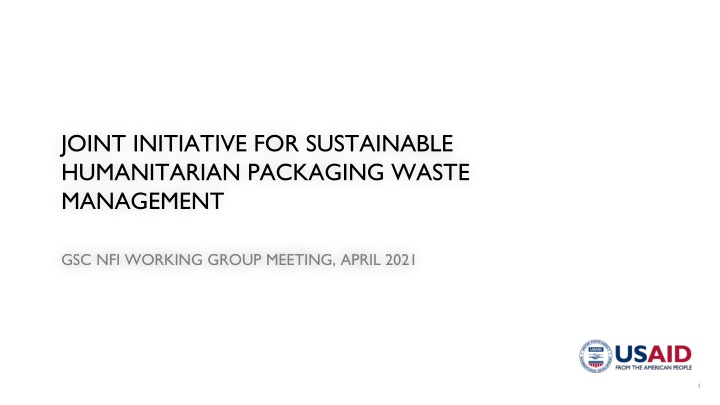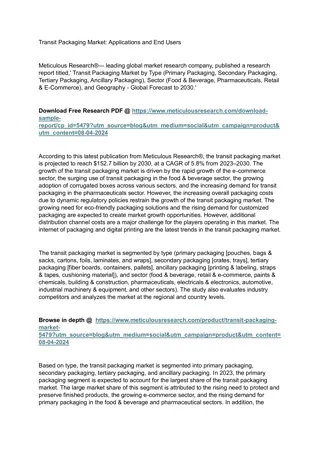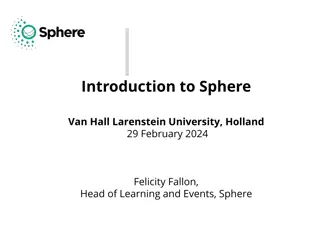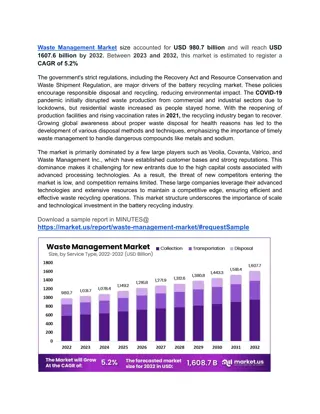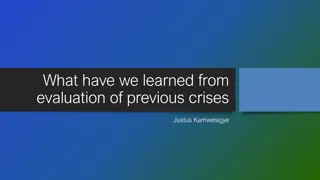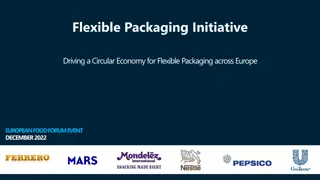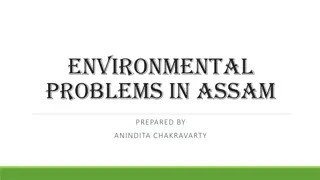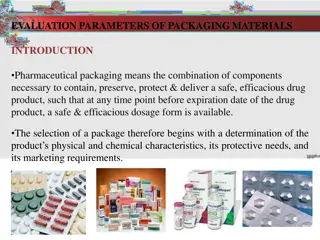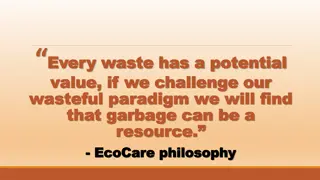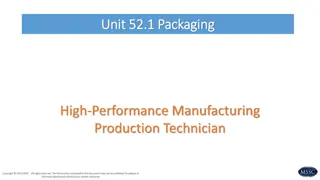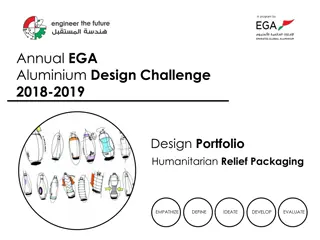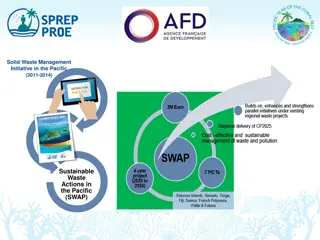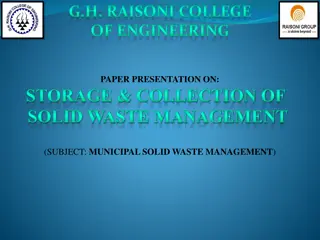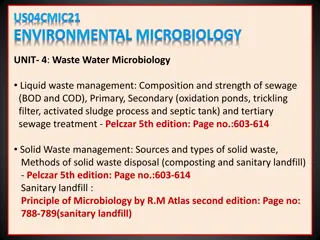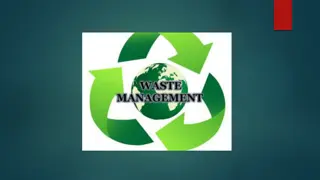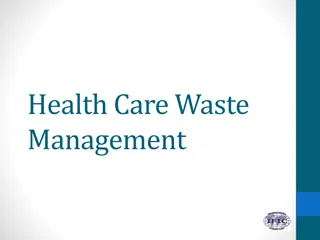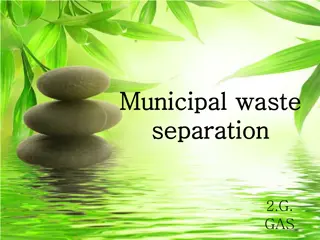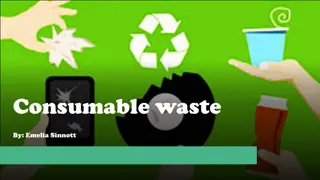Joint Initiative for Sustainable Humanitarian Packaging Waste Management Meeting Summary
Collaborative effort of 16 partners in the Joint Initiative for Sustainable Humanitarian Packaging Waste Management, highlighting key steps taken from 2019 to April 2021. The initiative aims to achieve sustainable changes, coordinate efforts, reduce packaging waste, and engage in technical stakeholder activities. Opportunities for collaboration in policy, advocacy, and data collection have been identified. The initiative involves stakeholders such as USAID, WFP, ECHO, UNEP/OCHA, and other humanitarian organizations.
Uploaded on Oct 07, 2024 | 0 Views
Download Presentation

Please find below an Image/Link to download the presentation.
The content on the website is provided AS IS for your information and personal use only. It may not be sold, licensed, or shared on other websites without obtaining consent from the author.If you encounter any issues during the download, it is possible that the publisher has removed the file from their server.
You are allowed to download the files provided on this website for personal or commercial use, subject to the condition that they are used lawfully. All files are the property of their respective owners.
The content on the website is provided AS IS for your information and personal use only. It may not be sold, licensed, or shared on other websites without obtaining consent from the author.
E N D
Presentation Transcript
JOINT INITIATIVE FOR SUSTAINABLE HUMANITARIAN PACKAGING WASTE MANAGEMENT GSC NFI WORKING GROUP MEETING, APRIL 2021 1
COLLABORATIVE EFFORT: 16 partners A Joint Initiative - to achieve sustainable changes, leverage strengths and experiences and share the burden to reduce the burden Many ongoing efforts to improve packaging and reduce packaging waste Lack of coordination - opportunity to increase impact and find collective solutions Steering Committee: USAID, ECHO, WFP, UNEP/OCHA Joint Environment Unit, IOM, Global Logistics Cluster, ICRC, Danish Refugee Council, Save the Children, CRS Technical Coordination Working Group: all of the above plus the Global Shelter Cluster, UNHCR, IFRC, FCDO, RISE, UNHRD Lab, MIT Lincoln Labs 2
JOINT INITIATIVE KEY STEPS TO DATE 2019 - Co-conceived with USAID & WFP/GLC July 2020 - Scoping Published: informed planning of the JI Nov 2020 - Collaborative Roadmapping (joint planning process) January 2021 - 4 year Logframe & Activity Plan published (scoping + partner priorities + joint planning) Feb 2021 - meeting to approve activity plan March 2021 - Activity kick off, with different orgs leading & multiple orgs participating in each activity April 2021 - USAID/ECOS funding for implementation phase (coordination; communications, policy & learning; support services; lead on some technical activities) April 2021 - first Technical Coordination Working Group meeting
OPPORTUNITIES FOR COLLABORATION POLICY and ADVOCACY Short guidance note cheat sheet for main HA contexts, including plastic bans, relevant Basel convention regulations, transboundary movements etc. Led by the UNEP/OCHA Joint Environment Unit with consultant support from USAID inputs from BRS and operational partners with experience of working with new regulations. Starting May 2021-when consultant on board sub-working group will be set up 1.1.4 Guidance note on international & national policies governing plastic use TECHNICAL STAKEHOLDER ENGAGEMENT Need to coordinate across organisations and sectors to share information and coordinate on technical activities Similar initiatives spanning shelter, logs and all sectors Set up in Q2 2021; use throughout and beyond the Joint Initiative. GLC can provide this platform, pending funding to update it Technical coordination and information dissemination platform set up and used to share technical information 1.3.1 PACKAGING DATA & EVIDENCE Started by WFP with existing LCA initiative for one food packaging item Opportunities for funding further LCAs being explored by USAID ECHO funding for LCAs may be available via ERC HIP 2021 (interest in joint application?) Link to BRE/GSC ECOP shelter materials LCA tool which incorporates some packaging and in discussion on inclusion of additional types of packaging LCAs of highest volume packaging items / most commonly delivered items per country/region 2.1.2
OPPORTUNITIES FOR COLLABORATION PROCUREMENT Many partners have or are introducing specification improvements that can be shared across the sector. This would be followed by the discussion on standard specifications and how to take this forward. GSC work on specification improvements (packaging & commodities) Specification improvements for packaging of main relief items and standard specifications are proposed. 2.2.1 Various partners are already working on this and can share sustainability criteria and experience. GSC trying to incorporate sustainable procurement in tendering for manufacturers Starting April 2021 post TCWG, led by DRC 6 months for development of criteria list, followed by a piloting phase 2.2.3 Packaging sustainability criteria list for tender contracts DESIGN, PRODUCTION & DISTRIBUTION GSC NFI working group looking at environmental impact of NFIs Number and type of products will dependent on stakeholder priority & interest, ideally covering food, non-food and kits. Existing initiatives: PP bags via Innovation Norway funding (ICRC, WFP, UNHCR); UNHRD re-designed items (e.g. hygiene kit). Late 2021/early 2022: could leverage EU's R&D funding, and could focus on specific priorities of partners R&D to reevaluate the design of most common packaging products to increase sustainability 2.3.2
OPPORTUNITIES FOR COLLABORATION END OF LIFE MANAGEMENT GSC interest in recycling/repurposing of specific items In discussions with WFP re leading with support from USAID Partners can influence locations / methodology A first step could be sharing tools, processes and data already being used to map this type of info Results can be integrated into the GLC Logs Capacity Assessments. Mapping of available waste management infrastructure in operating countries 2.4.1 Leads tbc based on locations & partners' priorities Work with private sector and local actors Design a methodology that can then be applied in other locations. Pilot solutions. Could include a fact sheet on waste types and market based solutions for types waste (global solutions) Guidance on market-based opportunities for secondary use of packaging (Reuse, recycling and repurposing in key crisis locations) 2.4.4 To engage the field and match field needs to technological options and allow field practitioners to more easily incorporate into response. Raised as a priority by the ECOP 2.4.5 Catalogue of packaging management tools and methods for field use
DISCUSSION Questions/comments? Discussion on opportunities for collaboration Related activities of the NFI WG? Join sub-working groups for certain activities?
NEXT STEPS Activity planning and implementation Partners contacted by activity leads to set to sub-working groups and define scope of work for specific activities - a good time to join! Funding ECHO/EU funding exploration/applications Events & Comms HNPW: April 26 - briefing session on the Initiative & April 30 Technical Session Newsletter: Joint.Initiative@icf.com Coordination Next TCWG meeting in June. Steering Committee 17 May
THANK YOU! USAID CONTACTS: Dr. Erika Clesceri (eclesceri@usaid.gov) Greg Olson (golson@usaid.gov) Greg Rulifson (grulifson@usaid.gov) Chris Pettit (Chris.Pettit@icf.com) Mandy George (mandy.george@cadmusgroup.com) Carmen Saab (Carmen.Saab@cadmusgroup.com) bha,scm.sustainability@usaid.gov Mike Mikkoff: michael.minkoff@cadmusgroup.com CREDIT: UNEP/OCHA JEU 11/11/2020 10
MOST PACKAGING BECOMES WASTE (EVENTUALLY) Unintended consequence of vitally important services Few systems to manage solid waste in most humanitarian contexts Packaging can also = opportunities PHOTO CREDIT: UN JEU 11
SCOPING: PRIORITIES IDENTIFIED 1. Enhance Humanitarian Coordination 2. Private Sector Engagement in Policy and Standard Setting 3. Detailed Assessments and Case Studies 4. Production, Procurement, Distribution, Usage 5. End of Life Management
